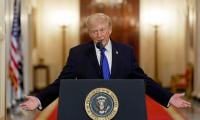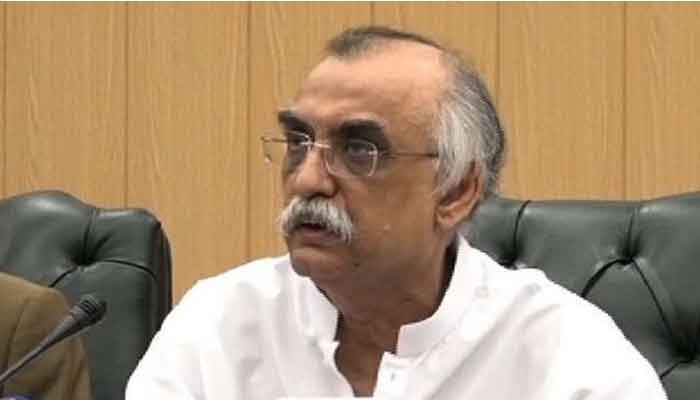All is not well in FBR: Shabbar Zaidi to decide today on going on leave
Rumors are rife in Islamabad that Shabbar has conveyed to top government functionaries that he is going on a long leave from Monday
ISLAMABAD: Chairman Federal Board of Revenue (FBR) Shabbar Zaidi is not feeling well and will today (Friday) decide to go on leave for an indefinite period.
When The News contacted him in this regard Thursday night, he said, “I will decide on the medical advice tomorrow (Friday)”.
Rumors are rife in the federal capital that Shabbar had informed Adviser to the PM on Finance Dr Abdul Hafeez Shaikh and other top government functionaries on Thursday that he wasgoing on a long leave from coming Monday. His aides told this reporter that Shabbar had cancelled many meetings this week, as he was not feeling well.
It has been learnt that Dr Abdul Hafeez Shaikh visited the FBR for the first time in six months leaving its top guns red faced, as he showed his displeasure at the FBR’s performance.
He also arranged several meetings with the textile tycoons at the finance ministry to resolve the issue of refunds payment through FASTER software but this lingering controversy could not be solved, disturbing him a lot. After the meeting at the FBR headquarters, the chairman applied for a two-week leave on medical grounds.
Earlier, Shabbar Zaidi had gone on a sick leave from January 6 to January 19. On January 11, the FBR rejected rumors about ‘any sort of rift in the government economic team'.
“Rumors of any sort of rift in the economic team is utterly incorrect," said the FBR in a statement adding that Shabbar Zaidi was on a two-week leave. However, insiders say things are not as smooth as has been claimed by the FBR. It is yet to see whether Shabbar will prefer to stay or leave the office after getting medical advice on Friday (today), concluded the sources.
-
 Cardi B Hits Back Hard At Critics Of Her Little Miss Drama Tour
Cardi B Hits Back Hard At Critics Of Her Little Miss Drama Tour -
 King Charles Sees Andrew Going To Jail As Chance To Protect Monarchy
King Charles Sees Andrew Going To Jail As Chance To Protect Monarchy -
 NJ Transit Bus And Train Lines Operating Again On Modified Schedule After Winter Storm
NJ Transit Bus And Train Lines Operating Again On Modified Schedule After Winter Storm -
 Peter Mandelson Freed On Bail Following Arrest In Public Office Misconduct Case Linked To Epstein
Peter Mandelson Freed On Bail Following Arrest In Public Office Misconduct Case Linked To Epstein -
 Trump Warns Trading Partners: Countries 'playing Games’ After Court Ruling Will Face Even Higher Tariffs
Trump Warns Trading Partners: Countries 'playing Games’ After Court Ruling Will Face Even Higher Tariffs -
 Robert Carradine, 'Revenge Of The Nerds' Star, Passes Away At 71 After Decades-long Battle With Bipolar Disorder
Robert Carradine, 'Revenge Of The Nerds' Star, Passes Away At 71 After Decades-long Battle With Bipolar Disorder -
 Alex De Minaur Faces Surprise Elimination In Acapulco Thriller By Patrick Kypson
Alex De Minaur Faces Surprise Elimination In Acapulco Thriller By Patrick Kypson -
 Ethan Hawke Raises Eyebrows With Risque Response To Question About Eating In Bed
Ethan Hawke Raises Eyebrows With Risque Response To Question About Eating In Bed -
 Princess Beatrice, Eugenie Enter Crisis Talks As Parents Sins Start Bleeding Onto Them: ‘Help Me Girls!’
Princess Beatrice, Eugenie Enter Crisis Talks As Parents Sins Start Bleeding Onto Them: ‘Help Me Girls!’ -
 US Ambassador To France Charles Kushner Barred From Meeting French Government After Missing Meeting
US Ambassador To France Charles Kushner Barred From Meeting French Government After Missing Meeting -
 Moby Sings Praises Of Eminem After Calling Rapper 'misogynist, Homophobe, Racist And Antisemite' 25 Years Ago
Moby Sings Praises Of Eminem After Calling Rapper 'misogynist, Homophobe, Racist And Antisemite' 25 Years Ago -
 'Tediously Monastic' Moby Reveals How Spiritual Discipline Impacted His Love Life
'Tediously Monastic' Moby Reveals How Spiritual Discipline Impacted His Love Life -
 New Zealand PM Christopher Luxon Backs Removing Ex-Prince Andrew From Line Of Succession
New Zealand PM Christopher Luxon Backs Removing Ex-Prince Andrew From Line Of Succession -
 Bella Hadid Looks Back On Opportunities She Lost In A Year Amid Lyme Treatment
Bella Hadid Looks Back On Opportunities She Lost In A Year Amid Lyme Treatment -
 Meghan Markle’s Family Shares Important News Amid Estrangement
Meghan Markle’s Family Shares Important News Amid Estrangement -
 Charley Crockett's Canadian Tour Cancelled After Being Denied Entry Into Canada Over Past Felony Conviction
Charley Crockett's Canadian Tour Cancelled After Being Denied Entry Into Canada Over Past Felony Conviction




